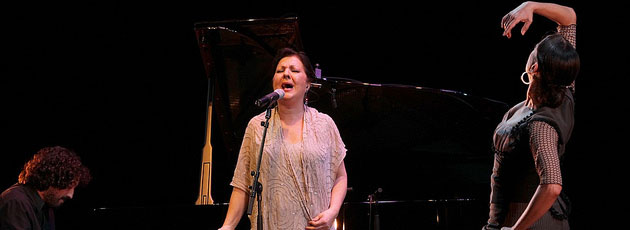Texto: Estela Zatania
Fotos: JeanLouis Duzert
Wednesday, January 16th, 2013. 8:00pm. Teatro de Nimes (Francia)
NIMES AGAIN OPENS THE YEAR WITH A NOTEWORTHY PROGRAM
Flamenco in Nimes. That short phrase is enough for any fan of the artform to identify an event which has opened the flamenco calendar for the last twenty-three years. More than two decades during which the performance venues of this charming city, so rich in history and ancient Roman references, so linked to Spanish culture, have received this genre’s top interpreters.
The official program with something for every taste and age-group, got underway on the 7th. On previous days we were able to enjoy the works of superstars like Eva Yerbabuena, promising young hopefuls like Olga Pericet and Leonor Leal and interesting projects such as that of guitarist Antonio Moya and his people from Utrera. If last year’s festival brought the “discovery” of Extremadura’s flamenco, it was such a success that this year room was made for a repetition of the experience with singers Celia Romero and Pedro Cintas, and the dancing of Jesús Ortega.
On Monday, José María “Rito y Geografía” Velázquez Gaztelu once again fascinated listeners with his illustrated conference, and midday Wednesday, Juan Vergillos delivered his tribute to Enrique Morente. With some important shows yet to come, such as those of Javier Barón, Marco Flores and Tomasito, or that delightful show “Boboterías” that debuted at the last Bienal de Sevilla, last night we attended the return to Nimes of Carmen Linares after an absence of 18 years.
The singer arrived with her show “Ensayo Flamenco 2012”, which is a medley of earlier work devoted to adapting verses of well-known poets, something for which Carmen has long been known. The words of Miguel Hernández, Federico García Lorca, Juan Ramón Jiménez and Rafael Alberti, in addition to José Ángel Valente and the versatile José Luis Ortiz Nuevo, came to musical life in original songs by such illustrious musicians as Juan Carlos Romero and Manolo Sanlúcar (although they are not named on the program). There were also some moments of cante, such as a martinete, a malagueña of la Trini and a stylized granaína, but most of the recital is devoted to lyrical song, a specialty Carmen Linares dominates to perfection, lovingly adapted to flamenco rhythms.
A certain coldness in the audience’s reaction was relieved by brief appearances by Belén Maya. The daughter of Mario, a revolutionary dancer in his time, Belén, who claims not to have wanted to know anything about flamenco until the age of 18, is an excellent synthesis of the most traditional and most avant-garde dancing, with the magic touch of her original personality which gives perfect flamenco coherence. A short dance with shawl and bata de cola to the compás of alegrías, and another bit of siguiriyas, were the most flamenco moments of the evening.
Carmen stood beside the piano of Pablo Suárez to interpret several songs which would conform a mini recital within the recital. The group was completed with the guitars of Salvador Gutiérrez and Eduardo Pacheco and the percussion of Quique Terrón.
This performance of “Ensayo Flamenco 2012”, a work which will be remembered for its meticulous presentation, was broadcast live via radio.
